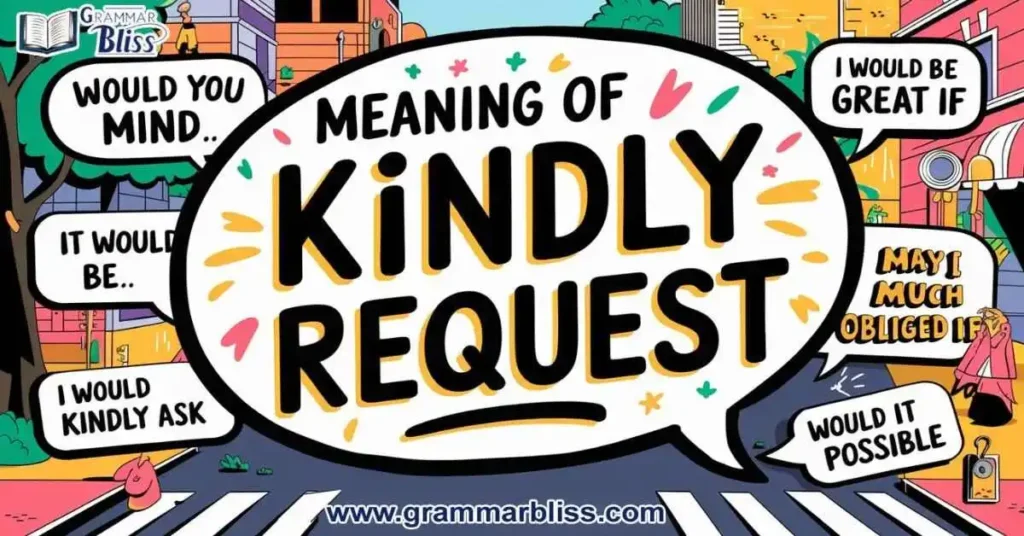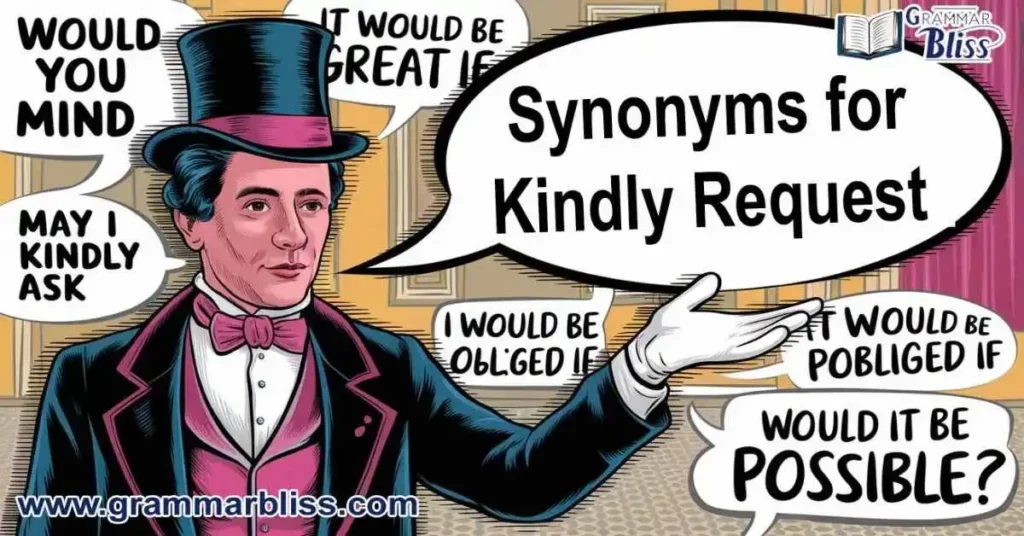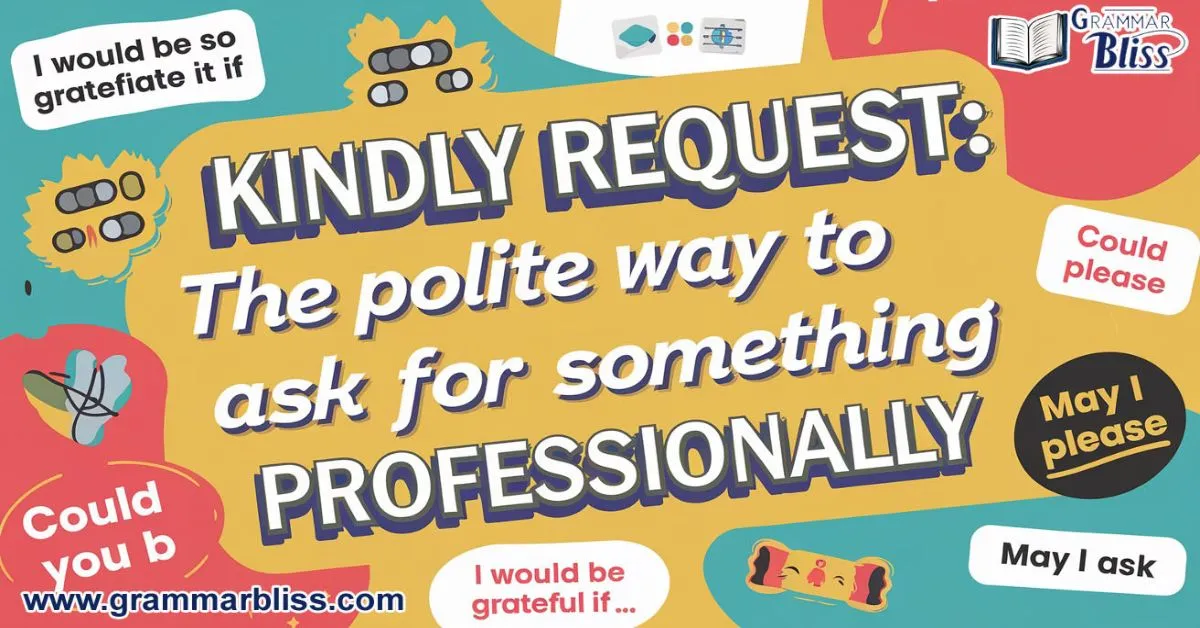In the world of professional communication, how you make a request matters. Whether you’re drafting a business email or crafting a formal letter, using the right phrasing can help maintain professional relationships and convey your message clearly. One common yet polite phrase is “kindly request.”
This polite request softens the ask and adds a level of formality that is often needed in business correspondence. But is it always the best choice? Here, we’ll explore the meaning of “kindly request”, when it’s appropriate to use, and its impact on your communication skills. Let’s dive into how you can use this phrase effectively in various professional settings.
Quick Summary
The phrase “kindly request” is often used in professional settings to make a polite and respectful request. It combines two words—“kindly” and “request”—which together create a formal tone that softens the impact of the request. It’s commonly used in business emails, letters, or other formal communication situations where you need to ask for something or request assistance. However, its use can vary based on the situation and audience, and while it is considered polite and respectful, it may sound overly formal in some more casual professional environments.
In this blog post, we’ll explore when to use “kindly request,” whether it’s still considered professional, and provide a list of synonyms and alternatives you can use. We’ll also discuss grammar rules and offer helpful tips for using this phrase in emails and letters.
Read: Input vs Imput: Which One is Correct?
Meaning of “Kindly Request”

To understand “kindly request,” we need to break it down. “Kindly” is an adverb that softens the tone of the sentence. It suggests that you are asking for something in a polite and considerate manner. It’s not demanding; rather, it shows respect for the recipient. “Request” refers to asking for something, whether it’s help, information, or permission. When you put these two words together, you’re creating a phrase that conveys politeness and respect while making a formal ask.
In simple terms, “kindly request” means you are politely asking for something, but with an added level of courtesy. It’s commonly seen in business emails, formal letters, and other official communications where the tone needs to remain respectful and professional. This makes it ideal for maintaining professional relationships.
For example, instead of saying, “I need the report,” which could come across as too direct, you might say, “I would kindly request the report at your earliest convenience.” This subtle change softens the request and shows consideration for the other person.
Usage of “Kindly Request”
Knowing when and how to use “kindly request” is key to its effectiveness. This phrase is often used in formal communication settings, particularly when you need to ask for something without sounding too blunt. For instance, in business emails or formal letters, you might use “kindly request” to ask for assistance, schedule a meeting, or ask for permission.
In a professional setting, such as when you’re requesting help from a colleague or sending a request for help to a client, using “kindly request” can help maintain a polite and respectful tone. It shows that you’re being thoughtful and considerate in your communication. If you’re asking for a favor, such as needing an extra document or clarification, this phrase can make your request feel more courteous and less demanding.
However, it’s important to keep in mind that in casual professional contexts, such as informal emails or when speaking with peers or teammates you know well, using “kindly request” might sound overly formal. It can make you appear stiff or distant, which may not align with the tone of your workplace or the relationship you have with the person you’re communicating with.
Example:
- Formal Communication: “I kindly request your assistance with the upcoming project.”
- Casual Communication: “Could you help me with the project?”
“Kindly Request”: Is It Professional to Say?
While “kindly request” is widely regarded as a formal and polite way to ask for something, whether or not it’s considered professional depends on the context and audience. In more traditional industries like law, finance, or customer service, this phrase remains very appropriate, as it ensures that requests are made with respectful language and professionalism.
In modern professional contexts, however, language has become more casual, especially in creative industries, startups, or tech companies. There, business etiquette might lean towards simpler, more direct communication. In these environments, “kindly request” may come off as old-fashioned phrasing or even overly formal.
Therefore, “kindly request” is professional, but its appropriateness depends on the specific setting and the tone you wish to convey. If you are unsure about whether to use it, it’s always good to observe the tone of communication at your workplace or ask your colleagues how they prefer requests to be phrased.
Advantages or Disadvantages of Using “Kindly Request”
Advantages of Using “Kindly Request”
- Conveys Respect: The phrase shows politeness and respect, which helps maintain positive professional relationships.
- Maintains Professionalism: It provides a formal tone to requests, which is often expected in business emails and official communications.
- Softens the Request: Using “kindly request” helps soften the request, making it less direct and more considerate, which can prevent coming across as too demanding.
- Appropriate for Formal Contexts: It’s perfect for formal writing or customer service communications, where maintaining a professional demeanor is essential.
- Fosters Positive Interactions: By using polite language, it helps build mutual respect and promotes more cooperative and professional relationships.
Disadvantages of Using “Kindly Request”
- May Sound Overly Formal: In casual professional contexts, using “kindly request” can make communication sound too stiff or old-fashioned, which may not always suit the tone of modern workplaces.
- Can Be Seen as Unnecessary: In some situations, especially in informal emails or direct conversations, it may seem like an unnecessary formality when a simpler phrase could suffice.
- Less Direct: The phrasing might make the request sound indirect or overly complicated, which can be perceived as less clear communication in fast-paced work environments.
- Potentially Reduces Efficiency: In some business correspondence, the phrase can take up extra space, making emails longer than needed, especially in situations where concise language would be more effective.
- Not Always Suitable for All Professional Settings: Some modern industries or more creative professional environments may favor a more direct and relaxed tone, where such formal phrasing could feel out of place.
Synonyms for Kindly Request

Finding “Kindly Request” is too formal for your needs, there are many other ways to ask politely. Here are some common synonyms that convey the same polite tone but might be more suitable for different professional situations:
- I would appreciate it if
- Meaning: A polite way to request something.
- Example: “I would appreciate it if you could send me the updated report by tomorrow.”
- Would you be so kind as to
- Meaning: A formal and polite request.
- Example: “Would you be so kind as to provide the necessary documentation for my review?”
- I would be grateful if
- Meaning: A polite way to express gratitude in advance for a request.
- Example: “I would be grateful if you could assist me with the presentation.”
- Could you please
- Meaning: A direct but polite request.
- Example: “Could you please help me with this issue when you have time?”
- May I ask
- Meaning: A polite way of requesting something.
- Example: “May I ask you to confirm the meeting time for next week?”
- I would like to request
- Meaning: A formal way to ask for something.
- Example: “I would like to request your assistance in completing the project.”
- Would you mind
- Meaning: A polite way to ask someone for a favor or permission.
- Example: “Would you mind reviewing this report before the meeting?”
- If it’s not too much trouble
- Meaning: A polite request that minimizes the effort required by the other person.
- Example: “If it’s not too much trouble, could you send me the files by the end of the day?”
- Could you kindly
- Meaning: A polite and respectful way to ask for something.
- Example: “Could you kindly provide me with your feedback on the document?”
Learn: verb-should-understanding-and-usage-in-sentences/
- Would you be willing to
- Meaning: Asking if someone is open to helping with something.
- Example: “Would you be willing to attend the conference call tomorrow?”
- It would be great if
- Meaning: A polite way of asking for something with enthusiasm.
- Example: “It would be great if you could help me organize the event.”
- May I kindly ask
- Meaning: A respectful way of making a request.
- Example: “May I kindly ask you to send me the updated proposal?”
- If you could
- Meaning: A polite way to ask someone to do something.
- Example: “If you could confirm the details, I’d appreciate it.”
- I would be much obliged if
- Meaning: A formal and respectful way to ask for help.
- Example: “I would be much obliged if you could review my report.”
- Would it be possible
- Meaning: A polite way to inquire about the possibility of something.
- Example: “Would it be possible for you to attend the meeting tomorrow?”
- If it’s convenient for you
- Meaning: A respectful request that considers the other person’s schedule.
- Example: “If it’s convenient for you, could we schedule a call for next week?”
- At your convenience
- Meaning: A polite way to ask for something at a time that works best for the other person.
- Example: “At your convenience, could you review these documents?”
- Would you mind if I
- Meaning: A polite and considerate way to ask for permission.
- Example: “Would you mind if I took the day off next Friday?”
- Please let me know if you can
- Meaning: A polite way to ask someone to confirm if they can help with something.
- Example: “Please let me know if you can attend the meeting on Monday.”
Explore: campus-or-campuss-a-complete-guide-to-possessive-forms
- Could I trouble you to
- Meaning: A polite way to ask for help, acknowledging that you may be putting someone out.
- Example: “Could I trouble you to send the files to me by 3 PM?”
- Would it be alright if
- Meaning: A polite way to ask for permission.
- Example: “Would it be alright if I submitted the report by tomorrow morning?”
- I would like to ask
- Meaning: A polite and straightforward way to ask for something.
- Example: “I would like to ask for your opinion on the proposal.”
- I hope you can
- Meaning: A polite and hopeful way to ask for something.
- Example: “I hope you can help me with this task.”
- Please don’t hesitate to
- Meaning: A polite way to encourage someone to feel free to take action.
- Example: “Please don’t hesitate to contact me if you need further information.”
- Would you consider
- Meaning: A polite way to suggest an action for someone to think about.
- Example: “Would you consider approving the budget this week?”
- I humbly request
- Meaning: A formal and respectful way to ask for something, often used in more serious contexts.
- Example: “I humbly request your assistance in completing this task.”
- Would you be so kind to
- Meaning: A polite and respectful way to ask someone for help.
- Example: “Would you be so kind to review this document for me?”
- If you wouldn’t mind
- Meaning: A polite way to ask for something, recognizing that it might be an inconvenience.
- Example: “If you wouldn’t mind, could you send me the meeting notes?”
Grammar Rules and Examples
When using “kindly request,” it’s important to follow proper grammar rules to ensure your request is clear and polite. Typically, “kindly request” is used in a complete sentence, often followed by a verb in the infinitive form (e.g., “to receive,” “to help”).
Here are a few examples:
- Correct: “I would kindly request your assistance with this task.”
- Incorrect: “I kindly request you to help me.”
In professional writing, maintaining a clear request phrasing is essential to avoid misunderstandings. You also want to ensure that your language remains formal but still natural. Overcomplicating sentences can cause confusion, so stick to a structure that’s easy to understand while still polite.
FAQ’s
What does “kindly request” mean?
It is a polite and formal way to ask for something or make a request.
Is “kindly request” considered professional?
Yes, it is a professional and respectful way to ask for something, especially in formal communication.
When should I use “kindly request”?
Use it when you want to make a polite request, especially in business emails or formal letters.
Can “kindly request” sound too formal?
Yes, it can sound overly formal in casual professional contexts, so be mindful of the tone.
What are some alternatives to “kindly request”?
Alternatives include phrases like “Would you mind,” “Could you please,” and “I would appreciate it if.”
Conclusion
Using the phrase “kindly request” in professional communication can enhance politeness and maintain a formal tone. While it’s highly effective in situations requiring respectful language, be mindful of the context, as it may sound overly formal in some casual professional settings. By understanding when and how to use this phrase, you can strengthen your professional relationships and improve your communication skills. Overall, a well-crafted polite request is key to clear communication and successful business correspondence.

